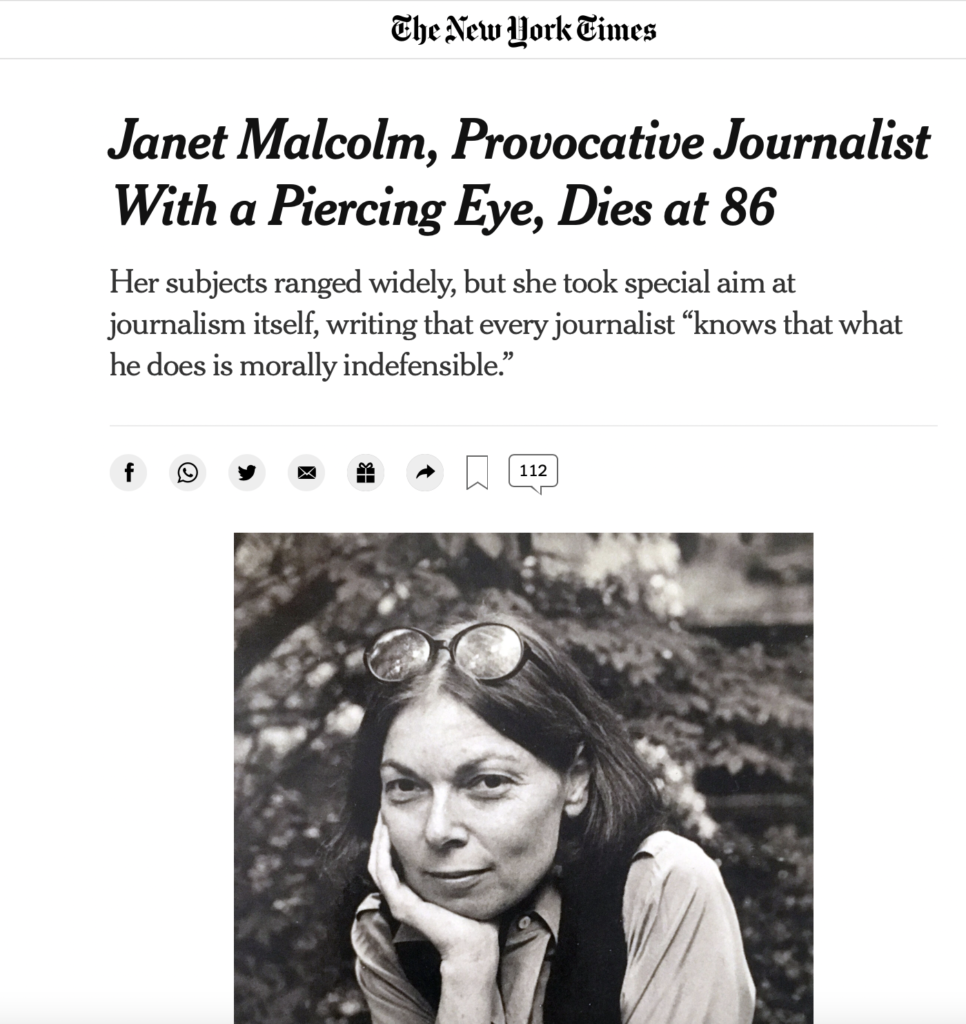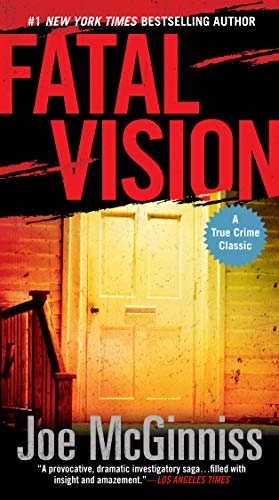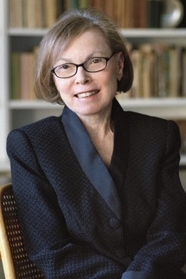I hope I don’t shock too many readers when I admit that, until last week, I’d never read a single article by author and venerated New Yorker journalist, Janet Malcolm. She’s the one who is famous for taking journalism to task in a splendid two-part article titled “The Journalist and The Murderer.” It is subtitled, “What Is Journalism For?”

Janet Malcolm’s Controversial Article
I read her controversial article last weekend a couple of days after Malcolm passed away from lung cancer. Then, I disappeared down the rabbit hole, hopping from one Malcolm article to another enthralled by her depth — and length.
 “The Journalist and the Murderer” is about the trial of a true crime author who was sued by a convicted murderer for fraud and breach of contract. Jeffrey MacDonald is the murderer convicted of killing his pregnant wife and two daughters in 1970. Joe McGinniss is the journalist who wrote the bestseller, Fatal Vision about MacDonald’s crime. The book was published in 1983.
“The Journalist and the Murderer” is about the trial of a true crime author who was sued by a convicted murderer for fraud and breach of contract. Jeffrey MacDonald is the murderer convicted of killing his pregnant wife and two daughters in 1970. Joe McGinniss is the journalist who wrote the bestseller, Fatal Vision about MacDonald’s crime. The book was published in 1983.
The libel trial started in 1984 when MacDonald claimed that McGinniss –who was given the opportunity of daily contact with MacDonald and his defense team –had deceived him into thinking that his book would paint MacDonald as innocent. In fact Fatal Vision pointed wholly to MacDonald’s guilt. Malcolm wrote her two-parter in March 1989 after a hung jury was unable to return a verdict in the case.
It should be said in defense of my ignorance of Malcolm and specifically of her splendid two-parter, back in 1989, my time was consumed by a 10-month old baby and commuting between Philadelphia where we lived and New York where I was an associate producer for the tabloid TV show, A Current Affair.
Assigned Article

In any event, these are the opening paragraphs of that article:
“Every journalist who is not too stupid or too full of himself to notice what is going on knows that what he does is morally indefensible.
He is a kind of confidence man, preying on people’s vanity, ignorance or loneliness, gaining their trust and betraying them without remorse
Of course, the article outraged many journalists, and there is much to debate in just that opening sentence. Some journalism is truly a public service where investigative reporters set out to uncover ugly truths about our public servants. This is probably why the Malcolm article is assigned in journalism schools all over the country. Therefore, most likely, my protagonist, Jenna Sinclair, an investigative reporter in my new novel, Fool Her Once, would have been just such a student.
Is Fictional Reporter, Jenna, A Con Woman?
When I blogged about my thriller a couple of weeks ago, I described how Jenna, as a rookie reporter, outs the secret son of a notorious serial killer, and how her expose has devastating consequences for the son and his family.
In Fool Her Once, Jenna shows she has the makings of an intrepid reporter when she gets the former fiancee of the executed serial killer to open up about the relationship twenty years later — which leads to Jenna’s discovery that the result was an illegitimate child, now a young man.
After reading Janet Malcolm’s article last weekend, I thought briefly about my fictional heroine and whether she fit into that category of a “confidence [wo]man preying upon people…”
In Jenna’s defense, I would say maybe, but as a rookie reporter covering her first big story she does not yet have the cut-throat instinct of a tabloid reporter. In fact, the tragic consequences of her scoop, lead her to make a devastating choice for her own life and career.
Little Bit of Guile
It’s true she uses a little bit of guile to wheedle her way into an interview with the serial killer’s fiancee. And, it’s just sheer luck that she doesn’t get the door slammed in her face. That’s mostly the situation I and other fellow tabloid reporters at Star Magazine faced daily when we set out to interview celebrities — or even regular folk. We never got the chance to “prey on people’s vanities, ignorance or loneliness” and very rarely got the chance to “gain their trust.”
As was more likely, we gathered a story about this-or-that celebrity from various, different sources and then called the celebrity, or more usually his/her publicist for a comment, to give them a chance to rebut the facts if we were wrong.
Big Fat Lie
 Which didn’t always work if I recall one such incident at Star Magazine when we received a sure-fire tip that TV icon, Mary Tyler Moore had entered the Betty Ford Center for her alcohol addiction. Her publicist, who was almost as famous as MTM replied: “Oh definitely not. In fact, she’s sitting here with me right now in my office having tea.”
Which didn’t always work if I recall one such incident at Star Magazine when we received a sure-fire tip that TV icon, Mary Tyler Moore had entered the Betty Ford Center for her alcohol addiction. Her publicist, who was almost as famous as MTM replied: “Oh definitely not. In fact, she’s sitting here with me right now in my office having tea.”
Which, of course, proved to be a big fat lie when MTM admitted her alcohol dependence in her 1993 biography — which was subsequently excerpted in People magazine
This, of course, undermined another tenet of Janet Malcom’s which she revealed in the New Yorker article when she wrote: “To disbelieve what a person says goes against all our instincts. We tend to believe each other.”
To which I would have to say, we never applied that rule at Star Magazine. Especially if we were talking to publicists. LOL!
2 Things In Common With Janet Malcolm
That said, I think I would have enjoyed having Malcolm as a friend. We had two things in common, for sure. First, we were both children of immigrants — me in London with Polish parents; Malcolm in Manhattan arriving from Czechoslovakia at the age 5. As such we both went to our first day of school not knowing a word of the English language.
Secondly, Malcolm’s second husband was her colleague (her editor) at The New Yorker — as was my husband, Joe, my colleague (the general manager) at Star Magazine. That snippet in Malcolm’s obituaries last week reminded me of that much happier time when office romances were not frowned upon, and sometimes even led to decades-long marriages.